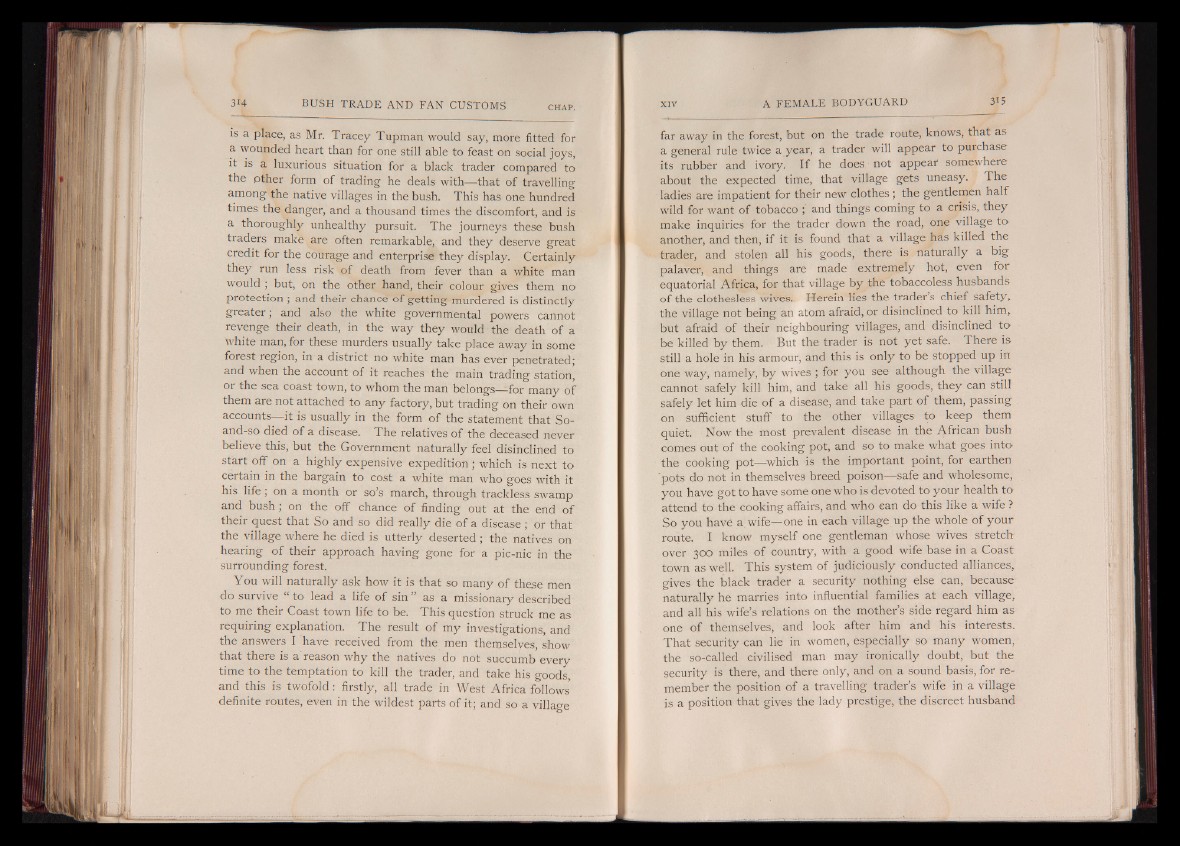
is a place, as Mr. Tracey Tupman would say, more fitted for
a wounded heart than for one still able to feast on social joys,
it is a luxurious situation for a black trader compared to
the other form of trading he deals with— that of travelling
among the native villages in the bush. This has one hundred
times the danger, and a thousand times the discomfort, and is
a thoroughly unhealthy pursuit. The journeys these bush
traders make are often remarkable, and they deserve great
credit for the courage and enterprise they display. Certainly
they run less risk of death from fever than a white man
would ; but, on the other hand, their colour gives them no
protection ; and their chance of getting murdered is distinctly
greater; and also the white governmental powers cannot
revenge their death, in the way they would the death of a
white man, for these murders usually take place away in some
forest region, in a district no white man has ever penetrated;
and when the account of it reaches the main trading station,
or the sea coast town, to whom the man belongs— for many of
them are not attached to any factory, but trading on their own
accounts— it is usually in the form of the statement that So-
and-so died of a disease. The relatives of the deceased never
believe this, but the Government naturally feel disinclined to
start off on a highly expensive expedition; which is next to
certain in the bargain to cost a white man who goes with it
his life ; on a month or so’s march, through trackless swamp
and bush; on the off chance of finding out at the end of
their quest that So and so did really die of a disease; or that
the village where he died is utterly deserted ; the natives on
hearing of their approach having gone for a pic-nic in the
surrounding forest.
You will naturally ask how it is that so many of these men
do survive “ to lead a life of sin ” as a missionary described
to me their Coast town life to be. This question struck me as
requiring explanation. The result of my investigations, and
the answers I have received from the men themselves, show
that there is a'reason why the natives do not succumb every
time to the temptation to kill the trader, and take his goods
and this is twofold: firstly, all trade in West Africa follows'
definite routes, even in the wildest parts of it; and so a village
far away in the forest, but on the trade route, knows, that as
a general rule twice a year, a trader will appear to purchase
its rubber and ivory. I f he does not appear somewhere
about the expected time, that village gets uneasy. The
ladies are impatient for their new clothes; the gentlemen half
wild for want of tobacco ; and things coming to a crisis, they
make inquiries for the trader down the road, one village to
another, and then, if it is found that a village has killed the
trader, and stolen all his goods, there is naturally a big
palaver, and things are made extremely hot, even for
equatorial Africa, for that village by the tobaccoless husbands
of the clothesless wives. Herein lies the trader’s chief safety,
the village not being an atom afraid, or disinclined to kill him,
but afraid of their neighbouring villages, and disinclined to
be killed by them. But the trader is not yet safe. There is
still a hole in his armour, and this is only to be stopped up in
one way, namely, by wives ; for you see although the village
cannot safely kill him, and take all his goods, they can still
safely let him die of a disease, and take part of them, passing
on sufficient stuff to the other villages to keep them
quiet. Now the most prevalent disease in the African bush
comes out of the cooking pot, and so to make what goes into
the cooking pot— which is the important point, for earthen
'pots do not in themselves breed poisonB-safe and wholesome,
you have got to have some one who is devoted to your health to
attend to the cooking affairs, and who can do this like a wife ?
So you have a wife— one in each village up the whole of your
route. I know myself one gentleman whose wives stretch
over 300 miles of country, with a good wife base in a Coast
town as well. This system of judiciously conducted alliances,
gives the black trader a security nothing else can, because
naturally he marries into influential families at each village,
and all his wife’s relations on the mother’s side regard him as
one of themselves, and look after him and his interests.
That security can lie in women, especially so many women,
the so-called civilised man may ironically doubt, but the
security is there, and there only, and on a sound basis, for remember
the position of a travelling trader’s wife in a village
is a position that gives the lady prestige, the discreet husband